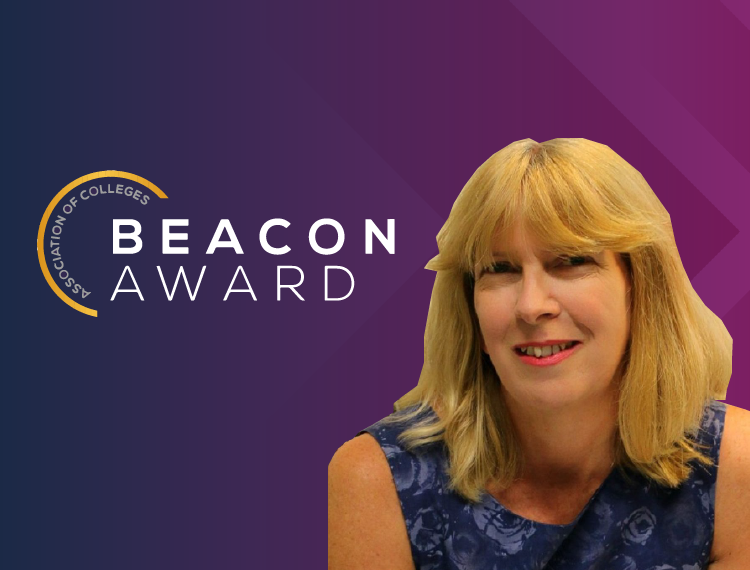New research highlights the long-term benefits of college awards

For the past 25 years, the Association of Colleges (@AoC_info) has been organising the annual Beacon Awards. A recognition and showcase of innovative practice in further education (FE), the Awards have become a regular and vital measure of success in the UK’s FE sector. As a long-term AoC partner, Edge has been proudly sponsoring the Edge Beacon Award for Excellence in Real World Learning since 2005.
Having been involved with the Awards since 2007, they have undoubtedly become the highlight of my year. It’s such a privilege to visit the shortlisted colleges, to see innovation in action, and to meet the staff, students, employers and stakeholders who bring these initiatives to life. It’s also a salient reminder of the importance of the continuing work that Edge does in advocating for real world learning in education.
But beyond the recognition that an award brings, what are the longer-term impacts?
Driven by evidence – as we always are – this is a natural question for Edge. It’s also why, in conjunction with the AoC, we’ve just published a review of past winners of the Edge-sponsored AoC Beacon Award. This is not simply a research piece. It’s an evidence-base of tangible rewards that should encourage colleges who have never applied before to consider taking part this year.
The most prominent finding in our research was that winning an Award raises college profiles, both across the FE sector and in local communities. Past winners all welcomed their win as an opportunity to celebrate and showcase the hard work of staff and students. As one course tutor put it, winning the award has “taken vocational education to higher-status.”
We also found an increased sense of pride in staff and students. Interviewees (primarily course leads and tutors) said they were proud that their initiative had won. Their students were also happy to be on a course that was so highly regarded. In some cases, this strength of feeling even extended to students applying to the courses. Seeing these initiatives in action, I can vouch that this sense of pride is well deserved!
Besides prestige, there were also more tangible benefits. For instance, the research found that winning an Award improves staff motivation. Staff at winning colleges felt responsible for maintaining the high standards of their work. They even wished to evolve their real world learning initiatives with new and creative teaching strategies. As one course lead explained, after winning, “we needed to continue proving why what we were doing was innovative; that meant [putting] more work into the initiative.”
The most substantial finding, however, was that winning an Edge Beacon Award attracts fresh industry and employer links. Research participants all cited increased stakeholder engagement. This is clear testament to the fact that winning goes beyond mere recognition of achievement – an award can actively lead to the expansion of real world learning initiatives, providing improved opportunities and outcomes for staff and learners alike. A case in point: at one college, the enthusiasm from large employers was so significant they had to create an entirely new role – a practical instructor to support the link between academic and real world learning.
Naturally, as winners, the colleges we interviewed had generally positive experiences. It was therefore important not to overlook any lessons learned. In this respect, two primary threads emerged. Firstly, an award highlighted the importance of continuing to develop the winning initiative. Increased scrutiny and a desire to keep initiatives running at a high standard demonstrate that innovation does not stand still. It is an ongoing cycle requiring continuous dedication.
Secondly, winning an award led to an increased need for staff professional development. Time management was a core challenge; after winning, staff members needed training to maintain their industry knowledge and to learn about new equipment, etc. While industry professional development opportunities improved as a result of winning, additional resources and support are necessary to maintain and develop initiatives over time.
However, for me, the main takeaway from the research is that an Edge Beacon Award is not merely a recognition of achievement. It is a powerful means of publicising excellence in FE. For the vast majority of past winners, initiatives have continued to develop and evolve, producing new opportunities for students, staff and the college community at large.
Having seen the winning initiatives firsthand, the research has only strengthened my conviction in the value of the Beacon Awards and Edge’s sponsorship. But I know there are diamonds in the rough out there – innovative colleges across the UK who have never considered applying for an award. I sincerely hope this research will encourage them to think about drafting an application this year. As our report shows, the rewards are ripe for the picking… but you’ve got to be in it to win it!
Jane Samuels is Director of Projects and Operations at the Edge Foundation and a sponsor assessor at the AoCs’ Beacon Awards.












Responses